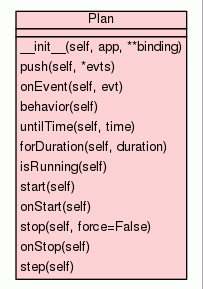
| Trees | Indices | Help |
|---|
|
|

Abstract superclass of scheduled behaviors Each Plan implements a "co-routine" consisting of a behavior that executes in parallel with other plans. It has its own event queue and event handler, and its own bindings to outputs. Class Plan is use by subclassing it and overriding the behavior() method with a generator -- i.e. a method that has a bunch of yield statements in it. The yield statements MUST all be "yield None", which can be abbreviated to "yield" with no parameters. The yields indicate the locations at which the Plan returns control to the owner JoyApp. Plans continue executing from where they stopped whenever the event handler returns True. Otherwise it should return False. Other return values will generate an exception. Plans may be nested; simply yield the plan that is to take over control. NOTE: Make sure that the nested Plan was start()-ed Some methods are designed to be used with yield, specifically: untilTime, forDuration WARNING: JoyApp is single-threaded. If a behavior spends too long between yield statements the entire JoyApp waits for it to complete. Typical usage: >>> class MyPlan( Plan ): ... def __init__(self,app): ... Plan.__init__(self,app) ... ... def onEvent( self, evt ): ... if evt.type == MOUSEMOTION: ... self.x = evt.pos[0] ... return True ... return False ... ... def behavior(self): ... print "Move mouse to the left" ... while self.x > self.app.cfg.windowSize[0]*0.25: ... yield ... print "Move mouse to the right" ... while self.x < self.app.cfg.windowSize[0]*0.75: ... yield ... print "Great job!! here are 3 tail wags for you" ... for wag in xrange(3): ... self.tailWagTo(100) ... yield self.forDuration( 500 ) ... self.tailWagTo(-100) ... yield self.forDuration( 500 ) BINDINGS: To allow plans to be easily adapted and re-used without sub-classing, the Plan constructor accepts a list of keyword argument "bindings" of the form <name>=<setter>, where <setter> is either a callable or a string naming a robot property to be resolved using app.robot.setterOf(). This allows self.<name> to be used in the Plan code for setting values that will only be chosen at the time the plan subclass instance is constructed. In the example above, we could have used MyPlan( tailWagTo='Nx55/@set_pos' ) to create an instance whose self.tailWagTo sets the position in robot node 0x55. Similarly, tailWagTo='>tail wag' would bind the output to the Scratch sensor named 'tail wag'
|
|||
|
|||
|
|||
|
|||
|
|||
|
|||
|
|||
|
|||
|
|||
|
|||
|
|||
|
|||
|
|||
|
|||
|
|||
|
|||
|
|||
|
|||
|
Inherited from |
|||
|
|||
|
Inherited from |
|||
|
|||
Initialize a Plan within some JoyApp application.
|
Push events into this Plan's event queue Events are only queued while the Plan isRunning(); otherwise they are silently dropped. |
(default) Event handler. Override this method to handle all events that were push()-ed to this Plan. The sequential behavior() in this plan only runs if onEvent returned True. All Plan-s recieve a copy of all TIMEREVENT events. If your sequential code does not need any other events, and just wants to execute in parallel with other Plan-s, it is safe to leave the default onEvent method, which always returns True NOTE: onEvent MUST return True or False. Other values raise an exception at runtime. |
(default) Override this method to implement the sequential behavior of a Plan This method MUST be a python iterator, i.e. must contain a "yield" statement |
A sub-plan that sleeps until a specified time. Use this from .behavior() with a statement of the form: yield self.untilTime( wakeup ) to sleep until the specified wakeup time. |
A sub-plan that sleeps for a specified duration. Use this from .behavior() with a statement of the form: yield self.forDuration( naplength ) to sleep for the specified duration |
Returns True if and only if this Plan is currently "running", i.e. its .onEvent handler receives events and its .behavior has not terminated. |
Start execution of a Plan's behavior. If Plan is already running -- issues a warning |
(default) Override this method to perform operations when Plan starts but before the first events are processed. |
Stop (abnormally) the execution of a Plan's behavior If not running, this call is ignored. INPUT: force -- boolean -- stop without raising termination exceptions in co-routines |
(default) Override this method to perform operations when Plan terminates. |
(private) Unwind Plan co-routines by throwing exceptions up the stack |
(private) Run onEvent() method on all incoming events OUTPUT: True if plan can go idle (no relevant events) or False otherwise |
(private) Execute one step from the iterator at the top of the stack OUTPUT: co-routine to execute as sub-Plan, or None |
Execute one time-step of Plan behavior. This method is called every time the .onEvent handler returns True for one or more events in a time-slice. |
(private) Plan yielded a sub-plan to execute -- process it |
| Trees | Indices | Help |
|---|
| Generated by Epydoc 3.0.1 on Thu Jan 4 16:46:17 2018 | http://epydoc.sourceforge.net |